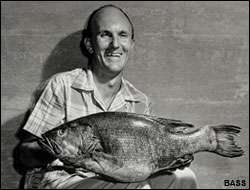
An angler would be incredibly fortunate to earn a single world record certificate in his life. Leitchfield, Kentucky's David L. Hayes has two — for the same fish, and the certificates came 50 years apart.
So if the new world record smallmouth bass looks a lot like the old world record smallmouth bass, there's a reason for that. It's the same fish.
When Hayes caught his 11 pound, 15 ounce brown bass from Dale Hollow Lake in 1955, he knew it was bigger than any smallmouth he had ever seen before, but he didn't know it was a world record. Then, after 41 years as the universally recognized record, a long lost document was located that cast doubt upon the integrity of the catch.
That's when the record keeping authorities at the International Game Fish Association (IGFA), National Fresh Water Fishing Hall of Fame and state of Kentucky had a feeding frenzy with Hayes' bass, disqualifying it and striking it from their books.
Only Tennessee reserved judgment. Instead of jumping on the disqualification bandwagon, they sent Ron Fox, the assistant executive director of the Tennessee Wildlife Resources Agency, on a factfinding mission. What he found cast doubt on the nay-sayers, not on Hayes or his fish.
Upon further review …
In October, Bassmaster published a story titled "The Case for David Hayes," which spelled out the facts and circumstances surrounding Hayes' catch and the many reasons for believing in its authenticity. The article stirred reader interest and helped to pave the way for reopening Hayes' case at the IGFA.
On Nov. 22, 2005, Ron Fox and I went to IGFA headquarters in Dania Beach, Fla., to meet with Mike Leech, Ambassador at Large of the IGFA, and Jason Schratweiser, the IGFA's Fishing and Science Director, to discuss Hayes' catch and its reinstatement. Leech was the IGFA's president in 1996 when the catch was disqualified and had a leading role in the matter.
We talked about the facts contained in the Bassmaster article, and Fox shared relevant portions of his voluminous file on the matter. In particular, Leech and Schratweiser took notice of the polygraph examination results of Ira Barlow, the brother of John who claimed to have shoved 3 pounds of weights into the fish. Ira swore that John was nowhere near the fish that day and passed a polygraph test to that effect.
They also considered the undisputed dimensions of the fish — 27 inches long and 21 2/3 inches around — and realized how unlikely it would be for such a bass to weigh less than 11 or 12 pounds. It was obvious that the tide was turning in favor of Hayes.
IGFA and freshwater fishing
IGFA has been maintaining freshwater fishing records since 1978 when Field & Stream turned their files over to the organization. Despite nearly 30 years in the business, however, it seems that IGFA is still focused on saltwater. Their recently published history, Big Game Fishing Headquarters: A History of the IGFA, contains only one photograph of a freshwater fish — a trout — and no mention at all of the world record largemouth bass, the most sought after record in all sportfishing.
In the book, Hayes' world record smallmouth is given little attention despite being called "arguably the most famous record disqualification in the history of angling." It mistakenly references the fish as being caught in 1925 rather than 1955.
Nevertheless, Leech and Schratweiser were determined to give Hayes a fair shake. They compared the dimensions of Hayes' bass to those of a bass caught by John T. Gorman from Dale Hollow in 1969. Gorman's fish was declared the record holder when Hayes was disqualified. His bass, which weighed 10-14, was both shorter (26 1/4 inches) and had less girth (21 1/2 inches) than the Hayes bass. The Hayes smallmouth had to weigh more.
Leech and Schratweiser also reviewed the polygraph results of Ira Barlow, the statement of dock manager Bobby Stone, the timeline surrounding the catch and weighing, and several other important factors. Fox gave details of the numerous interviews he conducted nine years ago when the major record keeping authorities pulled the rug out from under Hayes.
Ultimately, they found the evidence compelling enough to recommend reinstatement to IGFA president Rob Kramer and the IGFA rules committee. A quick decision was in order. Hayes, now 80, had endured the disqualification far too long.
Vindicated
In a news release dated Dec. 12, 2005, the IGFA announced its finding on the Hayes matter: "After an intense investigation of documents, many from 50 years ago, the International Game Fish Association … has reinstated a record for the biggest smallmouth bass ever caught."
The result was right, but the IGFA made a few mistakes along the way. Their release incorrectly gave the date of Hayes' catch as July 8, 1955 — it was actually July 9. They also misspelled the name of his hometown and named the wrong person as claiming to have tampered with the fish. Still, the man who caught the biggest smallmouth ever was back in the record book.
In a private telephone conversation prior to the release, Schratweiser called David Hayes to advise him of the decision and to apologize for the IGFA's disqualification nine years earlier.
"It's a shame that his record was taken away for those years," Schratweiser said, "but we were acting on the best evidence we had at the time. It was great talking to Mr. Hayes. I could tell that he was a person of integrity. He knew that he had caught the biggest smallmouth ever even if he wasn't given the proper credit, but it's good to have him back in his rightful place in the record book."
The IGFA even gave Hayes a life membership in their organization.
When the record was taken away from him, Hayes was quoted as saying, "I've held the record for 41 years, and I've had my fun. I'm not going to worry about it one way or the other. If they want to jerk it, let them jerk it. I'm not going to lose any sleep."
Maybe. But knowing that you've done something historic without receiving the rightful recognition for it has to be frustrating. And there was definitely a tone of satisfaction in Hayes' voice when I called to get his reaction.
"I feel great about this," Hayes said. "It's good to be vindicated after all these years.
"I'd pretty well given up on it," Hayes added, "but you guys [Bassmaster] put the pressure on them. I thought something might happen after the article came out."
Roberts' name cleared
David Hayes wasn't the only victim of John H. Barlow's deception. In fact, he probably wasn't even the intended target of the fraud. Dick Roberts was the owner of Cedar Hill Resort — where Hayes weighed the fish — and the cast of characters who created the false affidavit had a lot to gain by tainting his reputation.
John H. Barlow had already been fired by Roberts when Hayes brought the world record fish to the dock. Raymond Barlow, who took John's affidavit to the Corps of Engineers office, was a guide at a rival resort. Jimmy Reneau was the lawyer who prepared the affidavit. He owned Holly Creek Resort, across the lake from Cedar Hill. And Mary Ruth "Oopie" Reneau was not only the notary who witnessed the affidavit, but also the sister of Jimmy.
That they submitted the fraudulent affidavit to the Corps office rather than the record keeping authority of the day (Field & Stream) is a good indication that they were targeting Dick Roberts and Cedar Hill rather than Hayes and his lunker. If Roberts could be discredited, he might lose the license for his business.
"We're very excited that the Hayes record has been reinstated," said Roger Roberts, one of Dick's four sons now operating the resort. "We didn't care as much about the fish as we did our dad's reputation. Having his name muddied for all those years really hurt us. It's great that he's been cleared."

